Signs You Need Better Air Quality At Home
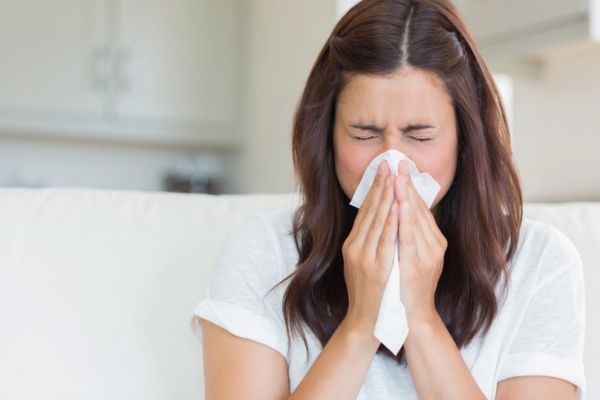
Most people spend a significant amount of time indoors. This makes it crucial to maintain good air quality to safeguard health and well-being. Poor indoor air quality can negatively affect physical health and overall comfort, underscoring the necessity of recognizing early warning signs that air quality needs improvement. Understanding air quality problems is essential for taking proactive measures to ensure a healthier living environment.
Hart Home Comfort, a leader in professional HVAC services, specializes in enhancing indoor environments. With their expert knowledge and advanced solutions, Hart Home Comfort ensures that homes not only feel comfortable but also support the health of their inhabitants. This article explores critical indicators of suboptimal air quality at home. Keep reading to learn more how to create a healthier living space.
The Importance Of Good Indoor Air Quality
Table of Contents

The quality of our environment significantly impacts our health and well-being. Considering that we spend most of our time indoors—sleeping, eating, working, studying, and socializing—it becomes crucial to maintain clean indoor environments. Prolonged exposure to pollutants indoors poses serious health risks.
By prioritizing indoor air quality (IAQ), we ensure a healthier, more comfortable daily life. Enhanced IAQ is associated with improved quality of life, reduced risk of chronic diseases, and decreased respiratory issues. Proactively monitoring air quality and promptly responding to problems is essential to maintaining optimal indoor environments.
Contact Hart Home Comfort Today! Schedule your indoor air quality assessment and breathe easier at home.
Indicators That Your Home Needs Improved Air Quality
As you become more aware of your home environment, recognizing signs of poor air quality is essential for maintaining a healthy living space. Here are the key indicators that your indoor air may need improvement:
Physical Health Symptoms Of Poor Indoor Air Quality
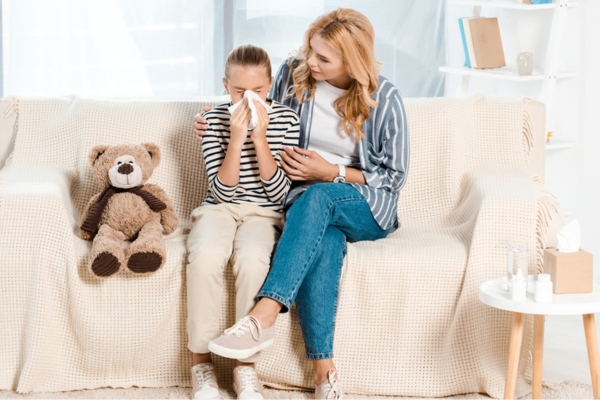
Poor indoor air quality can trigger or worsen allergies and respiratory issues like asthma. Common airborne irritants such as dust mites, pollen, pet dander, and mold thrive in poorly ventilated spaces, leading to symptoms like sneezing, coughing, wheezing, and nasal congestion. Indoor pollutants from tobacco smoke and particulate matter from activities like cooking or burning candles can exacerbate these respiratory problems.
Moreover, volatile organic compounds (VOCs) from everyday household products—like cleaning agents, aerosol sprays, and synthetic materials in furniture—can lead to other significant health issues, including chronic fatigue and frequent headaches. These compounds can impair air quality and result in symptoms such as persistent tiredness and difficulty concentrating.
Chemical pollutants like formaldehyde from pressed wood furniture and synthetic fragrances from household products can significantly irritate the skin. These substances can lead to dry, itchy, or irritated skin and exacerbate conditions like eczema, presenting symptoms like rashes.
Environmental Indicators Of Unhealthy Indoor Air Quality
Dust Accumulation
Excessive dust buildup is a telling indicator of poor indoor air quality. If dust accumulates quickly on surfaces even shortly after cleaning, it suggests that air filters may be inadequate or HVAC systems are not functioning effectively. This accumulation affects cleanliness and contributes to poorer air quality, as dust particles circulate continuously throughout your home.
Mold & Mildew
Mold and mildew growth clearly indicate inadequate air circulation and humidity control in indoor environments. Areas that remain damp or emit a musty odor likely suffer from high humidity levels, which promote mold spores’ growth. Visible mold spots on walls or ceilings and a persistent musty smell are vital signs that your home’s ventilation and moisture control systems need attention.
Bad Odors
Persistent stale or unpleasant odors in your home can also indicate poor ventilation. Odors from cooking, chemicals, or mustiness that do not dissipate signify that the air is not refreshed as it should be. Effective ventilation is crucial to remove these odors and ensure a supply of fresh air, which is essential for maintaining a healthy indoor environment.
Impact on Household Items
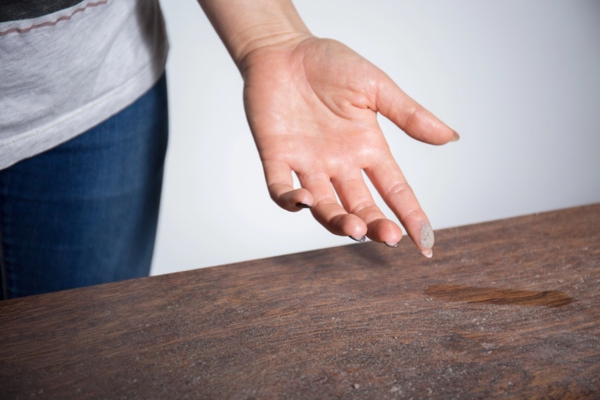
Quickly accumulating dust on furniture and other household surfaces indicates poor indoor air quality. If you need to dust frequently or notice visible particles on furniture and electronics soon after cleaning, your home’s air is likely carrying high amounts of dust. This requires more frequent cleaning and signals that the air contains larger particle pollutants.
Dirty HVAC filters significantly impact indoor air quality and the efficiency of your HVAC systems. If HVAC filters become dirty quickly or you notice an accumulation of dust around vents, it’s a clear indicator that the system is struggling to filter air properly.
Condensation on windows can be a symptom of inadequate ventilation and elevated humidity inside your home. When water droplets or foggy glass appears frequently, it suggests that the air inside cannot hold additional moisture, exacerbating issues like mold growth and allergen accumulation.
Breathe Cleaner Air! Contact Hart Home Comfort to book an appointment and ensure your HVAC system runs efficiently.
Pet-Related Indicators
Pets shed hair and dander, which can significantly contribute to poor indoor air quality. When pet hair and dander accumulate on furniture and float visibly in the air, these allergens are not effectively filtered out, which can aggravate allergies and respiratory issues in household members.
Strong pet odors in the home can also signal the need for better air filtration and ventilation. If pet smells linger despite regular cleaning and airing out of spaces, the existing air filtration system may not adequately capture and neutralize these odors.
HVAC System Performance
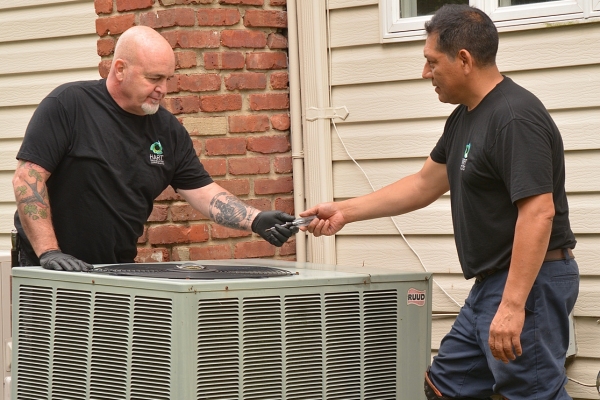
Poor air quality can significantly strain HVAC systems, leading to frequent maintenance issues. When air is laden with contaminants such as dust, pet dander, or chemical pollutants, HVAC systems must work harder to filter and circulate air, leading to more frequent breakdowns, lowered efficiency, and, ultimately, higher energy bills.
Inefficient airflow within an HVAC system can also be a telling sign of air quality issues. Observing inconsistent heating or cooling in various rooms or weak airflow from vents may indicate blockages or buildup in the ducts that restrict air movement. These symptoms affect comfort and signal that the system may not effectively manage air quality.
How To Improve Indoor Air Quality
Act fast if you see the signs above. Even small steps can have significant effects. Below are among the best things you can do to improve your IAQ:
Change Your HVAC Filter Frequently
HVAC systems can effectively block pollutants using air filters, but these filters lose efficiency as they accumulate dirt over time. To maintain optimal airflow and indoor air quality, it is crucial to change the filters regularly. This practice not only sustains clean air but also prolongs the lifespan of your equipment, enhances energy efficiency, and boosts system performance. For superior air filtration, opt for filters with high MERV ratings, as these are more effective at trapping finer particles and improving air quality.
Install a Whole House Air Filter
Pollutants vary in size, and standard HVAC filters may not capture the smallest particles. For enhanced protection against airborne irritants, consider installing a whole-house air filter. It’s advisable to consult an HVAC contractor to find a system best suited for your home, ensuring more comprehensive filtration and improved air quality.
Reduce the Sources of Pollutants
Identify the sources of air contaminants in your home and work to eliminate them. For instance, you can request that household members or guests refrain from smoking indoors and opt for non-toxic cleaning products. Additionally, choosing solid wood furniture over composite wood can be beneficial, as composite materials often emit formaldehyde, a common indoor pollutant. By addressing these sources directly, you can significantly improve indoor air quality.
Control the Allergen Levels
If you’re sensitive to allergens, there are several steps you can take to minimize their presence in your home without parting with your pets. Regularly brushing and bathing your pets can significantly reduce the amount of dander they release. Vacuuming your home thoroughly helps eliminate pet dander and dust. Additionally, washing bedding in hot water effectively kills dust mites in areas prone to mold, such as tiles, soap, and water, which are used for cleaning to keep mold at bay and maintain a healthier living environment.
Use Indoor Plants for Fresh Air
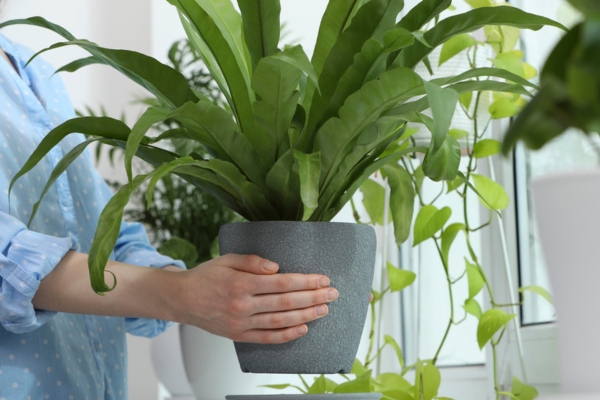
Humans inhale oxygen and exhale carbon dioxide, while plants absorb and release oxygen, reversing the process. This natural exchange makes indoor plants excellent partners for improving air quality. Adding plants to your home not only purifies the air but also enhances the visual appeal of your living spaces, creating a more soothing environment. The best plants for these purposes include common ivy, peace lily, and dracaena, which are known for their air-cleansing properties and aesthetic value.
Reduce Dampness Indoors
Damp surfaces in your home can lead to mold growth, release of volatile organic compounds (VOCs), property damage, and respiratory issues. To minimize dampness, promptly repair any cracked pipes and fix leaky roofs. Improving air circulation is also crucial in moisture-prone areas like bathrooms and kitchens. Using a dehumidifier, opening windows, or installing exhaust fans can significantly enhance ventilation, helping to prevent moisture buildup and maintain a healthier indoor environment.
Don’t Wait! Call Hart Home Comfort today to address your indoor air quality concerns and improve your family’s health.
Curb Heating System Risks
If your home has a fireplace or a wood-burning stove, be aware that these can release carcinogens into the air. While gas-powered heating systems like furnaces are generally less harmful, they are not without risks, such as potential carbon monoxide leaks. To safeguard your home, install carbon monoxide detectors and ensure they function correctly. Additionally, regular maintenance of your heating systems is crucial to guarantee they operate efficiently and maintain cleaner air in your home.
Air Quality Problems FAQs

Here are answers to some frequently asked questions about air quality problems to help you better understand and manage your home’s indoor environment.
How Can I Test The Air Quality In My Home?
You can test the air quality in your home using indoor air quality monitors, which measure pollutants like VOCs, particulate matter, and humidity levels. You can hire a professional HVAC service like Hart Home Comfort for a comprehensive assessment.
What Are Common Indoor Air Pollutants?
Typical indoor air pollutants encompass volatile organic compounds (VOCs), carbon monoxide, radon, mold spores, and pet dander.
How Often Should I Change My HVAC Filters?
Changing your HVAC filters every 1 to 3 according to the type of filter, the number of pets, and the overall air quality in your home is recommended.
Can Houseplants Improve Indoor Air Quality?
Yes, certain houseplants can help improve indoor air quality by absorbing pollutants like VOCs and increasing oxygen levels. Popular choices include spider plants, snake plants, and peace lilies.
What Is Ventilations’ Role In Maintaining Good Indoor Air Quality?
Proper ventilation helps to dilute and get rid of indoor pollutants by bringing in fresh outdoor air and exhausting stale indoor air. This is vital for maintaining a healthy indoor environment and preventing the accumulation of harmful substances.
Conclusion
Recognizing key signs of poor air quality, such as frequent allergies, persistent odors, and excessive dust accumulation, is crucial for maintaining a healthy home environment. Being proactive about air quality problems can significantly enhance your well-being and comfort. Hart Home Comfort specializes in improving indoor air through professional HVAC services, offering expert solutions to these common issues. To ensure your home supports your health, consider scheduling an indoor air quality assessment with Hart Home Comfort and initiate the journey toward a fresher, more breathable living environment.
Contact Hart Home Comfort for Premier HVAC Services
At Hart Home Comfort, we provide top-tier heating and cooling services, staffed by certified technicians who excel in HVAC tune-ups, repairs, installations, replacements, and more. Our technicians are not only highly trained but also bring a wealth of knowledge and experience to ensure your HVAC system is serviced with precision.
We pride ourselves on offering the most competitive rates for heating and cooling services in Nassau County, Suffolk County, and Queens, New York. Our maintenance services are designed to enhance your comfort and increase energy efficiency, ultimately reducing your heating and cooling expenses. Whether you need a repair or a complete system replacement, Hart Home Comfort will guide you to the best solutions that fit your needs and budget. We stand behind our work with a robust satisfaction guarantee. Call Hart Home Comfort today to schedule your service appointment and receive a free, in-home estimate.
For any questions about what Hart Home Comfort can do for you, give us a call today. Click here to contact us now or call us at (631) 667-3200 to find out more! Click the link to view our service area.

Related Articles:
- Unveiling the Health Implications of Subpar Indoor Air Quality
- Indoor Air Quality Demystified: All Your Essential FAQs Answered
- HVAC Allergies: How Your HVAC System Can Limit Seasonal Allergies
- How Household Products Contribute To Indoor Air Pollution
- 7 Reasons Your Filter Isn’t Improving Your Indoor Air Quality